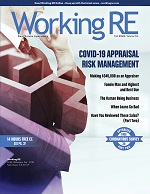 |
“One of the best courses that I have had in 17 years!” -Amy H
>> OREP E&O |
OREP/WRE Coronavirus Appraiser Blog
Coronavirus Appraiser Survey
>> New Survey: Appraiser Coronavirus Survey Part 2: What’s Changed?
The Human Being Business
By David Brauner, Senior Broker at OREP
You’ve probably heard the expression that “no matter what business you’re in, you’re in the customer service business.” Well, after 25 years of customer service I’ll go one further to say that if you’re in business, you’re in the human being business. Here’s what I mean.
Listening, being empathetic, giving your client the benefit of the doubt, understanding that you are the expert and not your client, are key, and it is your responsibility to both deliver the technical aspects of your job as well as to communicate it clearly in your report. If you want to be exceptional, you also need to do more: you need to anticipate what your customers may not know to ask. Why? Because if you fail to answer all the questions for your client, even the ones they don’t ask, you are likely to wind up with a dissatisfied customer, or worse, with a liability headache to deal with later.
Scope of Work
This happened to me recently. We were doing a small remodel project around our house. The arrangement we have with our contractor is that we supply the materials. Now I don’t know much about construction or building products. My wife handed me a request scrawled on a piece of paper with the dimensions for 24 boards for a backyard staircase.
Face masks in place, as prescribed by local guidelines during this COVID pandemic, my wife and I went down to a “big box” home improvement store to pick up the wood, along with some other materials. I went to “Lumber” and handed the “specialist” the order, thinking that would be that. He looked at me like, “what are you stupid pal?” Well, maybe I am but instead of helping the “idiot” (me), they directed me to what was a long, slow customer service line. After waiting at a distance of six feet, when it was my turn, the person staffing the desk said they had the lumber in stock but that it would take a day to be “pulled.” I said I’d wait, but they said to come back the next day at the same time and the order would be ready. Now keep in mind that there is some urgency for these boards, as the contractor’s strong suit is not planning any aspect of the project ahead of time—he needed the wood yesterday.
The next day I called the big box to see if the order was ready before heading down. No, it was not, they said. The next day I called again—nope, the order was still not ready. Really, I said? I was promised one day and now it is two days; could they check? Later that day, I did get a call: to come pick up my order? No such luck. No, the lumber was out of stock and they didn’t know when they would have more. Yes, they understood that when I ordered it two days ago it was in stock…sorry, they said.
As an aside, during the visit when I ordered the lumber, my wife had looked for some very specific screws for the project to reaffix a metal railing into concrete. One of the customer service folks said they didn’t carry them.
The prospect of shopping store to store during a pandemic (or any time) didn’t thrill me, so before I left I thought I would try to find the screws myself. I went to the fastener aisle and asked for the “expert.” He found the screws in a minute or two. I thought, how much did the first customer service person who “helped” my wife really care?
Anyway, back to the needed lumber. I went home and called a small lumberyard in my town that I have driven by dozens of times but never patronized. There are other, competing big box stores near me that I’ve frequented over the years but for some reason, this local lumberyard came to mind. First, when I called, a human being answered the phone. They did not put me on hold or transfer me multiple times before I got an answer either. I started out by saying I didn’t know what I was doing and he took it from there.
I told him the dimensions of the boards. He said, “You have three questions you need to ask your contractor.” You see, he understood that I didn’t know what I didn’t know—but he did. By being proactive, he reduced the chance of a wrong or incomplete order, extra expense for his lumberyard and a frustrated client (me). In your case, being proactive can mean gathering the information needed to get the job done correctly the first time and a happy, repeat client. More importantly, it reduces the chance of an unfortunate result that can lead to a dissatisfied client, and an increased chance of a state board complaint or worse.
Do I need Pine or Doug Fir? Do I want the boards smooth or rough; pressure treated or not? Looking back, it would have been an absolute miracle if I had gotten what I needed at the big box store because they never asked any of these questions, and neither did my contractor specify. The representative at the lumberyard gave me an order number before I hung up. I got the answers from my contractor and called back. A different person answered. They looked up my order in about three seconds. I told him the missing information and he said it would be ready in about 30 minutes…oh, and what is my contractor’s name in case he would picking up the order. He was picking it up. And the wood was less expensive than the big box. It went so smoothly I was nearly breathless! I needed more wood about a week later. Guess where I went?
The local lumberyard is staffed by experts who asked me the questions I did not know to ask. That is a concept I try to instill in OREP staff. We are the experts, not the insured. The result was a correct and complete lumber order, a happy client and a return customer (me). In your business, it may mean a complete report that answers all the pertinent questions and serves its purpose. The CSR at the lumberyard really knew his stuff but did not make me feel dumb for not knowing mine. That’s another issue. There is no advantage to making someone else feel stupid or their life harder, especially a client.
I don’t know about you but when I’m the expert in these situations—when the shoe is on the other foot—I get a great deal of satisfaction when my client is happy and their “problem” is solved efficiently. That is the best part of my job and always has been. In my case, it is when the insurance you all need is placed as smoothly and efficiently as possible. In your case, it may be the creation of a complete report which leaves no questions unanswered and serves its purpose to protect the interests of your client.
Another thing to note about my lumberyard experience is that a human being answered the phone and they could help. I was not left on hold or routed through an endless phone tree or made to explain to three different people before I got to the one person who could help. At OREP we call this “first call resolution,” and we strive for it every time. We are fully automated online to quote and bind, but we also answer the phone when someone needs a person to resolve their issue. Most times (not every time, but most times), the person who first answers can help without having to direct you to your agent (who most likely is on the phone). You’re busy in the field and if the first person who answers your call can solve your problem, you don’t have to sit on hold or leave a voicemail and wait for a return call. If you’re like me, you want your issue resolved ASAP. And OREP enjoys efficiencies as well by not having to call you back, possibly missing you, and having to call you again. And on and on. OREP is happy and you are happy because we could answer your questions quickly the first time.
Patience, Grace & Snoring
I’m not discussing your technical prowess as a professional. You need that for sure, but it’s not enough. You need to know how to handle, or more accurately, how to treat people. If you feel uncomfortable or inept or clumsy at dealing with people, just treat them the way you would like to be treated and you will never go wrong.
One more story. I use a CPAP machine for my sleep apnea, which by the way, eliminated my snoring. This was necessary if I did not want to sleep alone for the rest of my life. The CPAP machine requires distilled water, which isn’t so easy to come by in retail stores (and again, I’m writing this in the midst of the COVID–19 lockdown). I don’t like to shop even in the best of times. So for convenience, I have the distilled water delivered along with our bottled drinking water. Our water dispenser broke and we needed a new one. I called and ordered it. I was running low on distilled water so when I ordered the dispenser I made certain more distilled water would be delivered too. When the truck arrived, they had the dispenser but no distilled water. Now I KNOW I ordered the distilled water and was assured it would be delivered. No delivery would mean driving or calling around to various retail stores because I would soon run out. I could feel my blood pressure rising!
The driver’s reaction was patient and kind. He stood his ground that the water was not included in his delivery order, but he didn’t respond to my heightened emotion by matching it. Rather, he diffused the situation with his low-key, friendly demeanor. He listened. And that made me listen and think. In a moment or two, I realized that maybe the water I ordered was coming but in a different delivery, later in the week with the water delivery. Sure enough, the delivery today was for the dispenser only. I realized that I misunderstood or assumed incorrectly. Now maybe it should have been clarified and underlined ahead of time by the agent who took my order over the phone—that my water was coming at a later date with my regular delivery. Maybe it was communicated to me but I wasn’t listening (boy, does that happen!). I’m not sure, but I apologized to the driver and thanked him. My water was coming without me having to shop for it and I was grateful.
Humble and Kind
So when I talk about this aspect of customer service, I’m talking about what can only be described as humility. To me, it means not automatically assuming you’re right and the other person is wrong; it means being aware of when you’re getting defensive and more concerned with being right instead of solving the problem. As the “expert” you carry more than 50 percent of the responsibility for clear and complete communication. It’s your job to have the technical expertise to do the job and also to communicate your results to your clients so they understand. As a side note, our personal lives are not so different. One of my octogenarian choir buddies, married 65 years, shared with me his take on why his marriage has lasted so long: “To make it work, you both have to give 65 percent,” he said. I was confused by the math at first, but I’ve matured since.
In the professional world, it means fixing a client’s problem, not defending yourself. To be honest, one of our ex–agents was not so good at this. They were a competent insurance agent and clients generally loved them—they had a big, fun personality. But when a “conflict” arose, it often escalated because this agent cared more about being right or appearing smarter, than about the person they were supposed to help. I was often called in to resolve the issue. While the customer was seldom totally right, they were almost never totally wrong. There was almost always something we could have done better. Maybe returning a phone call a little more promptly (this agent was not great at that either) or taking the time to figure out what the client was really asking for or really needed instead of just giving them the easy answer. Over the years, when I tried to debrief the agent about what I learned so that they could do better next time, it was obvious they had no interest in improving—just in being right. And wasn’t I a jerk for taking the customer’s side? As I say, they no longer work at OREP. Their insurance intelligence grew over time but their emotional intelligence never did, despite the example I tried to set. It was more important to be “right” than it was to solve a client’s problem—and that’s not right; it’s wrong.
When I talk about “humility” as being an important attribute I mean putting the interests of the client before our egos and keeping an open mind about being able to do better. I suggest looking for any and every opportunity to improve professionally and personally. If you make a mistake, most people understand and are happy to help you—just admit it. But if you are condescending or insulting to them? Whew! Better look for another line of work.
I used to hear a lot of complaints from appraisers about the lack of knowledge on the part of the AMC staffers. Many of the AMC staff were not appraisers—entry level admins in some instances, who were given authority to correct veteran appraisers about their work. Many appraisers couldn’t stand it and left the profession or abandoned AMC work. Many, however, learned to adapt and flourish. They chose to try to educate the AMC staffers when possible, and in so doing, probably earned themselves loyal clients, as well commanding higher fees and avoiding time–consuming “call backs” to fix things that were not the way the lender wanted them. Satisfying the client, within ethical boundaries of course, offers another benefit: it will vastly reduce your liability.
In conclusion, I would respectfully suggest that you not assume that your clients know more than they do and/or are not very smart. That’s a tricky balance—so here’s what I mean:
1) Think about my lumberyard story: focus on solving the entirety of your client’s problem and not just what they ask for. Don’t assume they know more than they do. They need your help. And like me, your clients appreciate it and reward you with more business. And your job satisfaction will grow along with your bottom line.
2) At the same time, when a problem arises with a client, don’t assume your professional status means that you’re always right and they are always “dumb.” If you think that way, it will be evident no matter how hard you try to hide it. Think about the water delivery guy. He was right and I was wrong and his patience and calm gave me the space to realize it. When something goes wrong, I suggest examining it with a mirror first, instead of a microscope. After all, we’re in the human being business.
>> New Survey: Appraiser Coronavirus Survey Part 2: What’s Changed?
>> Join the Discussion at OREP/Working RE’s Coronavirus (COVID-19) Discussion and Resource Page; where you can share your thoughts, experiences, advice and challenges with fellow appraisers.
About the Author
David Brauner is Publisher of Working RE magazine and Senior Broker at OREP, a leading provider of E&O Insurance for appraisers, inspectors and other real estate professionals in 50 states (OREP.org). He has provided E&O insurance to appraisers for over 25 years. He can be contacted at dbrauner@orep.org or (888) 347-5273. California Insurance License #0C89873. Visit OREP.org today for comprehensive coverage at competitive rates.
Sign Up Now! $119 (7 Hrs)
OREP Insured’s Price: $99
>Opt-In to Working RE Newsletters
>Shop Appraiser Insurance
>Shop Real Estate Agent
Insurance
Send your story submission/idea to the Editor:
isaac@orep.org




